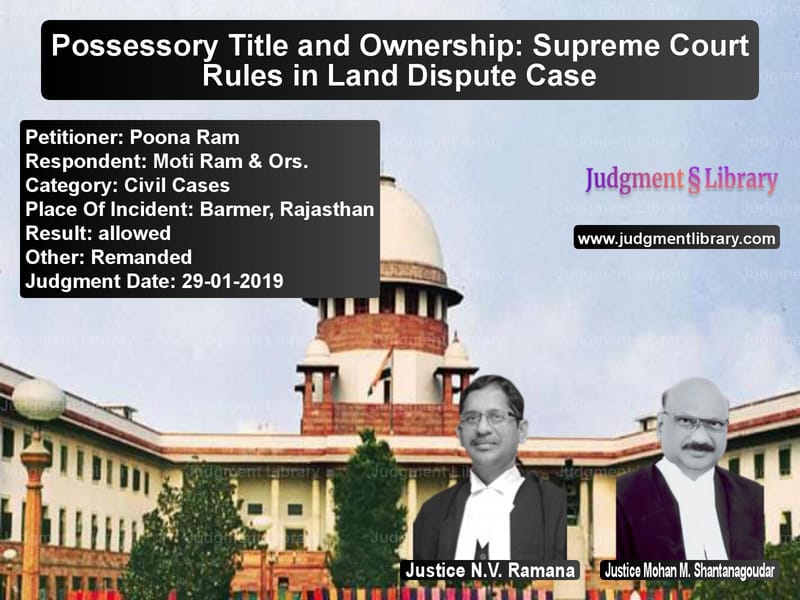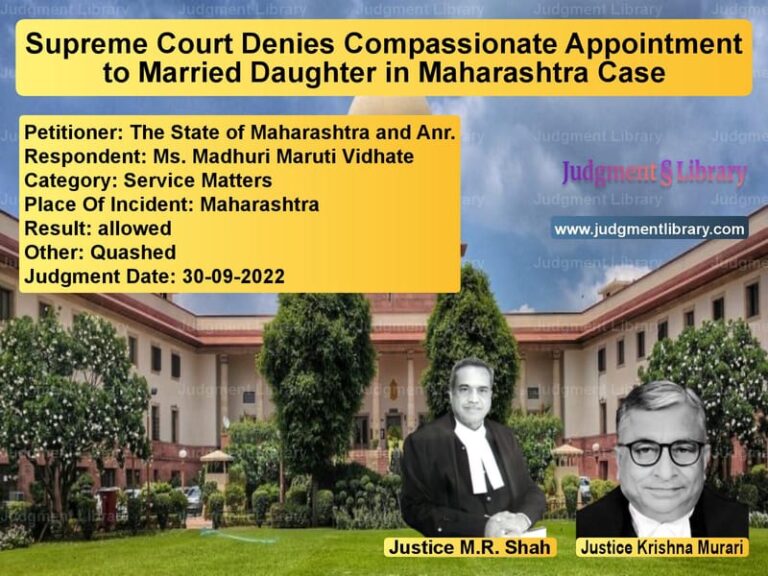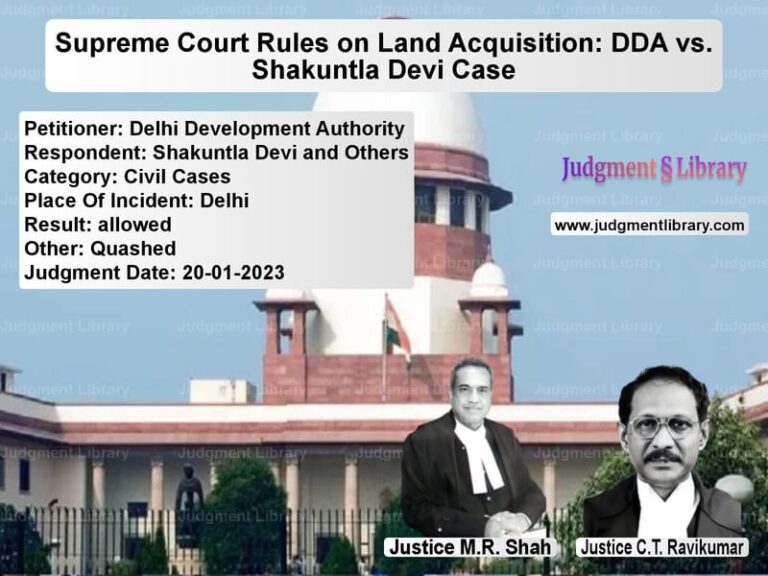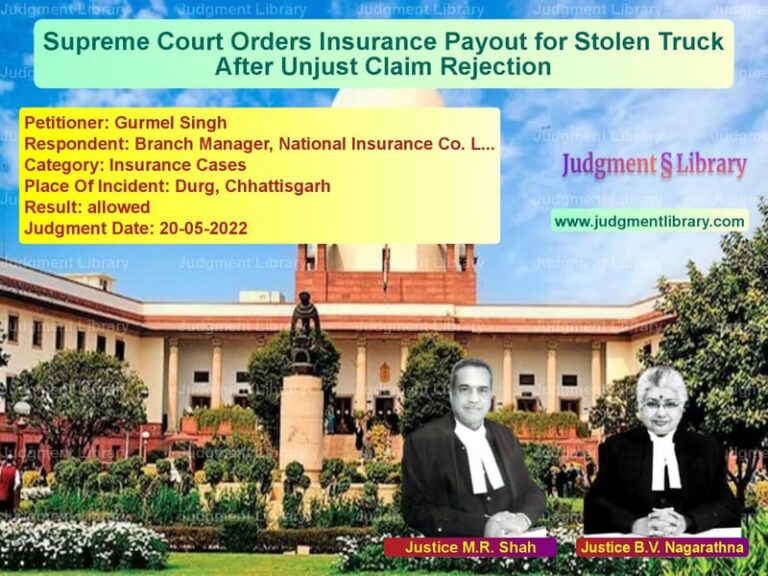Possessory Title and Ownership: Supreme Court Rules in Land Dispute Case
The Supreme Court of India recently ruled in Poona Ram vs. Moti Ram & Ors., a significant case regarding possessory title and ownership of land. The Court clarified the legal principles governing land possession, reinforcing the need for rightful ownership to be established with proper evidence. The ruling overturned a Rajasthan High Court decision and restored the judgment of the First Appellate Court, dismissing the claim of the plaintiff.
Background of the Case
The dispute centered around a piece of land originally owned by Jagirdar Khoom Singh under the Jagirdari system. After the abolition of the system in 1955-56, the land was resumed by the state. Parts of it were sold, while others were allocated to the municipality. The plaintiff, Moti Ram, claimed to have been in possession of the disputed land for many years but had no ownership documents. He alleged that he was wrongfully dispossessed by the defendant, Poona Ram, on April 30, 1972.
The case was first decided by a Trial Court, which ruled in favor of Moti Ram based on his long-standing possession. However, the First Appellate Court reversed this decision, holding that the defendant, Poona Ram, had a valid registered sale deed proving ownership.
The plaintiff then appealed to the Rajasthan High Court, which restored the Trial Court’s verdict. The matter was further challenged in the Supreme Court of India.
Key Legal Issues
- Whether the plaintiff, Moti Ram, had a better title over the suit property than the defendant.
- Whether the plaintiff had settled possession over the land that required lawful dispossession.
- The role of possessory title versus legal ownership in property disputes.
Petitioner’s Arguments
- Moti Ram claimed he had been in continuous possession of the land for many years.
- He argued that no one had a better title than him, and he had the right to claim ownership.
- The defendant’s title was disputed based on municipal records and alleged irregularities in the sale deed.
- Possession alone should be enough to claim a right to the land.
Respondents’ Arguments
- Poona Ram produced registered sale deeds proving ownership.
- The land was purchased legally and was part of a planned municipal colony.
- Moti Ram had no documented title and was relying only on alleged long possession, which was insufficient to establish ownership.
- Possession alone does not give the right to ownership if the rightful owner has valid legal documents.
Supreme Court’s Observations
The Supreme Court, comprising Justice N.V. Ramana and Justice Mohan M. Shantanagoudar, ruled in favor of Poona Ram, emphasizing the following:
“Settled possession or effective possession of a person without title entitles him to protect his possession as if he were a true owner. However, in the present case, there is no material on record to show that the plaintiff had settled or effective possession.”
The Court further explained:
- “Possession must be continuous, undisturbed, and to the knowledge of the owner. Stray acts of trespass do not establish possessory title.”
- “A person in possession has a good title against the world except against the true owner. However, when title is proved, possession without ownership cannot override legal ownership.”
- “Ownership based on valid sale deeds takes precedence over mere possession claims.”
Regarding the concept of possessory title, the Court referred to previous judgments:
“In Rame Gowda vs. M. Varadappa Naidu (2004), this Court ruled that a person in settled possession of land can defend possession even against the rightful owner. However, such possession must be continuous and lawful.”
Final Verdict
The Supreme Court ruled in favor of the defendant, Poona Ram, and dismissed Moti Ram’s suit:
“The plaintiff has not provided any documentary proof of ownership, and his claim of possessory title is unsupported by evidence. The findings of the First Appellate Court are upheld, and the suit stands dismissed.”
The judgment of the Rajasthan High Court was set aside, and the First Appellate Court’s decision was restored.
Legal and Social Implications
- The ruling reinforces the principle that ownership requires valid documentation, and mere possession is not enough to claim property.
- It clarifies the distinction between possessory title and legal ownership.
- The decision serves as a precedent in property disputes involving unauthorized possession.
- The case highlights the importance of registering property transactions to avoid legal disputes.
This ruling underscores the importance of legal ownership over possession and serves as a guide for future property litigation.
Petitioner Name: Poona Ram.Respondent Name: Moti Ram & Ors..Judgment By: Justice N.V. Ramana, Justice Mohan M. Shantanagoudar.Place Of Incident: Barmer, Rajasthan.Judgment Date: 29-01-2019.
Don’t miss out on the full details! Download the complete judgment in PDF format below and gain valuable insights instantly!
Download Judgment: Poona Ram vs Moti Ram & Ors. Supreme Court of India Judgment Dated 29-01-2019.pdf
Direct Downlaod Judgment: Direct downlaod this Judgment
See all petitions in Property Disputes
See all petitions in Landlord-Tenant Disputes
See all petitions in Judgment by N.V. Ramana
See all petitions in Judgment by Mohan M. Shantanagoudar
See all petitions in allowed
See all petitions in Remanded
See all petitions in supreme court of India judgments January 2019
See all petitions in 2019 judgments
See all posts in Civil Cases Category
See all allowed petitions in Civil Cases Category
See all Dismissed petitions in Civil Cases Category
See all partially allowed petitions in Civil Cases Category







